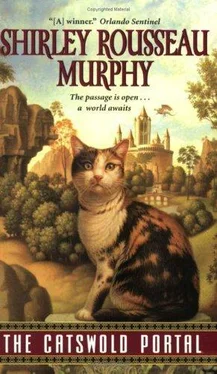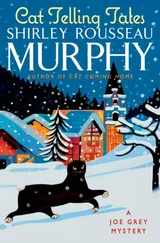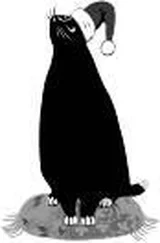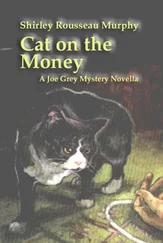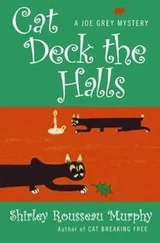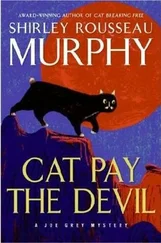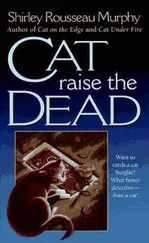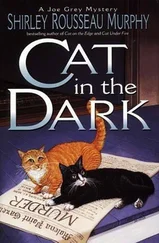Shirley Murphy - The Catswold Portal
Здесь есть возможность читать онлайн «Shirley Murphy - The Catswold Portal» весь текст электронной книги совершенно бесплатно (целиком полную версию без сокращений). В некоторых случаях можно слушать аудио, скачать через торрент в формате fb2 и присутствует краткое содержание. Год выпуска: 2005, ISBN: 2005, Издательство: HarperCollins, Жанр: Старинная литература, на английском языке. Описание произведения, (предисловие) а так же отзывы посетителей доступны на портале библиотеки ЛибКат.
- Название:The Catswold Portal
- Автор:
- Издательство:HarperCollins
- Жанр:
- Год:2005
- ISBN:9780060765408
- Рейтинг книги:4 / 5. Голосов: 1
-
Избранное:Добавить в избранное
- Отзывы:
-
Ваша оценка:
- 80
- 1
- 2
- 3
- 4
- 5
The Catswold Portal: краткое содержание, описание и аннотация
Предлагаем к чтению аннотацию, описание, краткое содержание или предисловие (зависит от того, что написал сам автор книги «The Catswold Portal»). Если вы не нашли необходимую информацию о книге — напишите в комментариях, мы постараемся отыскать её.
The Catswold Portal — читать онлайн бесплатно полную книгу (весь текст) целиком
Ниже представлен текст книги, разбитый по страницам. Система сохранения места последней прочитанной страницы, позволяет с удобством читать онлайн бесплатно книгу «The Catswold Portal», без необходимости каждый раз заново искать на чём Вы остановились. Поставьте закладку, и сможете в любой момент перейти на страницу, на которой закончили чтение.
Интервал:
Закладка:
She dared not tell Mag she had been to the Hell Pit or that she knew her name. She led the pony into the corral and unsaddled him and rubbed him dry, delaying, unable to think of any reasonable lie.
In the cottage she found Mag kneeling before the wood stove bedding down newborn piglets in a basket, and she was filled with guilt. The sow had farrowed. Against Mag’s instructions she had left the cannibalistic sow alone.
“I saved nine,” Mag said, scowling up at her. “Who knows how many she ate.”
“I—I was hunting mushrooms. I felt stifled in the cottage, I forgot the sow—I had to get out in the air.”
“And where are the mushrooms?”
“I lost the basket down a ravine—the pony bolted, I dropped the basket. Flying lizards were everywhere.”
Mag sat back on her heels. “Lizards don’t come for nothing. What were you doing, that they would watch you?”
“I told you, hunting mushrooms. I’m sorry about the pig. Truly, I forgot her.” Why had she mentioned the lizards?
Mag searched her face cannily. “Whatever you were doing, Sarah, it was to no good. And lizards promise no good. You’d best be wary, miss. You’d best stay in the cottage until the lizards tire of you.” Mag looked deeply at her. “You could be asking for more trouble than you imagine.”
She looked back at Mag innocently, but she was shaken. What did Mag know, or guess? Mag said nothing more until supper. She was, Melissa felt certain, angry about more than the sow. Could Mag know that she had gone to the Hell Pit? Or did the canny old woman know about the papers she had found beneath the linen chest?
Or was Mag’s distress about something else, some village crisis perhaps, or something to do with the secret rebellion? The rebels’ plans for war seemed so frail to Melissa. Yet the rebels were totally committed, and their ranks were growing. Selfishly she hoped Mag’s anger was centered around their problems, and not on herself.
She waited until supper, than asked innocently, “Did you not trade well for your beautiful cloth? The blue one alone should—”
“Traded fine,” Mag snapped, breaking the bread, her round, wrinkled face pulled into a scowl.
“Was—was there trouble for the rebels?”
“Yes, trouble!” Mag spread butter with an angry thrust. She had obviously been bursting to talk, and too upset to start the conversation herself. “Three leaders from Cressteane have been captured by the queen’s soldiers.”
“Oh, Mag. But how?” The rebels’ movements and identity were so carefully hidden. It was only with well thought out plans that she and Mag ever approached a rebel cottage. Even where a whole village was against the queen, the rebels were painfully discreet.
“Betrayed by one of our own,” Mag said. “And if those captured men are tortured into talking, our plans could be destroyed.”
“Where are the captives?” she asked casually. “In—in the dungeons of Affandar Palace?” And the Lamia’s voice filled her thoughts, The Toad sleeps — in the dungeons of Affandar Palace.
“Where else would they be but Siddonie’s dungeons?”
She stared at her plate. “Who was captured? Are they men I know?”
Mag looked hard at her. “You have never asked rebel secrets.”
“If they are captive, they are no longer secret.”
“The queen will not learn their names easily. What you don’t know, you can’t be forced to tell.”
They ate in silence until at last Melissa, too tightly wound to sit another minute, rose and picked up her plate. At the stove she heated water and did up the dishes while Mag took the piglets out to the sow, meaning to guard them while they nursed. Melissa worked idly at the spinning wheel while she made plans, her mind filled with the imprisoned rebels.
Rebellion had been building a long time against Queen Siddonie’s increasing enslavement of other Netherworld nations. And Siddonie’s rule within Affandar itself was crueler and more constricting each year. She had conscripted workers by enchantment, to go into the mines, and to serve in her growing army. She had torn families apart, and destroyed many of the traditional ways of making a living, destroyed people’s will to work. As a result, villagers were starving.
When Mag came in and knelt before the cookstove, getting the piglets settled in their basket, Melissa climbed into her cot and pretended sleep. Not until hours later did she rise again and, in the near-dark, pull on her dress, pack some bread and ham, and take up a waterskin and lantern.
Chapter 4
Braden, barefoot and wearing cutoffs, set his coffee cup on the terrace table. The garden was barely light, the dawn air cool and smelling of wet leaves. He stood idly studying the tangle of flowers and small trees and bushes trying to get awake, trying to shake a faint but depressing hangover. The three houses up the hill were still dark. The studio behind him was dark, though if work had been going well it would be a blaze of light. He would already have set up a canvas, poured out turpentine and oil, and become lost in the painting.
When Alice was alive they used to walk at dawn on Sundays, Alice striding out fast but seeing every leaf and change of color, every bird, every animal in every yard. They’d end up at Anthea’s in the village for breakfast, get the papers, read the reviews of the new exhibits. And when they were remodeling the house, they’d had breakfast out here on the terrace among the sawhorses and lumber, before the carpenters arrived. The front of the house had been torn out waiting for a new glass wall, gaping open to the garden like a bombed-out war casualty. They’d nailed canvas drop cloths over the forty-foot hole and Alice said that ought to be a big enough canvas for him to work on. Some of the inner walls had been torn away, too; they’d lived for ten weeks among bare studs and sheetrock dust. He could see Alice sitting here at the terrace table, her head bent, her long pale hair catching the light as she studied the blueprints. She’d been so happy to have the studio finished at last, to have her own place to work. The living room, dining room and entry hall had been turned into one forty-foot studio with rafters supporting the roof, and a skylight in Braden’s work area. Alice liked the softer light of the windows. She had taken a week to get her half of the studio set up, installing shelves, arranging the printing plates and handmade papers and etching and litho inks. Thinking about her was still like digging into a fresh wound.
Above him up the terraces a sound jarred him—the snip, snip, snip of garden clippers. He stared up at the dark, thin gardener who was hunched over a bush methodically trimming away. Vrech was a greasy, unpleasant man. And what the hell was he doing here so early? Waking up everyone else in the garden houses. The snap of the clippers was like gnashing teeth.
The six houses that circled the garden shared Vrech’s salary, but Olive Cleaver had hired him, years ago. The man did his job all right, kept the hillside tangle in just enough order to make the garden interesting, but he put Braden on edge; there was a cloying quality about him. Braden watched him, annoyed, pushing aside his sketch pad and pencils.
He had meant to plan a new painting this morning—as much as he ever planned, a rough start, some direction to give a model—but nothing stirred him. Nothing wanted to come to life, to make the light glow in his mind with the brilliance of a finished painting. Nothing he had considered lately had that brilliance. He felt as dull as if mind and spirit suffered from a toothache.
Sometimes he could jack up his lagging spirits by reading the reviews of his past shows or by recounting the frequent museum awards, a stupid ritual that meant nothing but would jolt his ego and get him started. He had less than two months to get the show together for Chapman, and he had only ten paintings and none of them meant a damn thing. Dull, uninspired. It would take twenty-five pieces to fill the gallery. He had thought of canceling the show—that would be the final admission of failure—but you just didn’t cancel a show with Chapman, a show you’d had scheduled for over two years, not unless you were ready to admit total defeat.
Читать дальшеИнтервал:
Закладка:
Похожие книги на «The Catswold Portal»
Представляем Вашему вниманию похожие книги на «The Catswold Portal» списком для выбора. Мы отобрали схожую по названию и смыслу литературу в надежде предоставить читателям больше вариантов отыскать новые, интересные, ещё непрочитанные произведения.
Обсуждение, отзывы о книге «The Catswold Portal» и просто собственные мнения читателей. Оставьте ваши комментарии, напишите, что Вы думаете о произведении, его смысле или главных героях. Укажите что конкретно понравилось, а что нет, и почему Вы так считаете.
